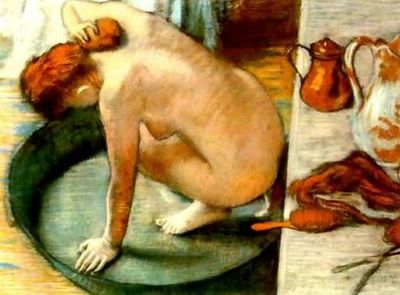Look at the bathroom as a chamber of dreams
Thomas Moore writes about the bathroom in his books and in Resurgence’s May-June issue (236) he summarizes the significance of those Bathroom Rituals, primarily associated with bathing. Space doesn’t permit exploration of shaving or the toilet in this particular Deep Spirit column. Moore’s father is a plumber, contributing to his watery interests, and his alchemical studies direct him to bathe his soul as well as his body. Moore mentions Greek associations with theological bathing and describes one of his favourite goddesses: Aphrodite whom he says is "the spirit of beauty, body, sensuality and sexuality, love, pleasure, and adornment." For Moore, the bathroom holds the "genuine rituals in the spirituality of Aphrodite/Venus:"

Edgar Degas, Le Tub (1886)
"It's important to spend time enjoying taking care of your body, not just for health but also for comfort and pampering. We live in a world that has adopted anti-Venusian values to live by and fails to see the virtue in simple bodily pleasures. Some identify spirituality with disregard for the simple pleasure of Venus. Maybe that is because Venus is a goddess or spirit of the deep soul rather than the sublime spirit. I might go so far as to say that good bathing might tame our tendencies toward violence. There is an ancient tradition that Venus calms the excited and warlike urges of Mars.Moore asks readers to reconsider what we feel while we become naked,
Just as a church might have a holy tabernacle and a Jewish temple sacred scrolls, so Aphrodite has her own spiritual implements: soaps, cosmetics, oils, fragrances, sponges, and towels. The tub is like a baptismal font, a good moisturiser, a kind of blessed oil. In Aphrodite's realm a luxurious towel may be as precious as a holy book."
"The simple act of disrobing is a Venusian gesture. It is probably difficult for most modern people to appreciate this shift in focus from shame to appreciation and from purity to sensuality. But to remain only in the religion of reserve and bodilessness is to deprive spirituality of its physicality, leaving it abstract and severe. Take away any degree of moralistic concern that has been forced on you, and see how the simple act of disrobing stirs your feelings."This historical split between pleasure and "an unnecessarily spartan spirituality" is a theme echoed elsewhere in Moore’s writings and he says why it bothers him: "It falsely separated body from spirit, thereby allowing no place for the soul."

Edgar Degas, Le Tub (1886)

Back to Barque: Thomas Moore
Back to Barque: Thomas Moore's Work